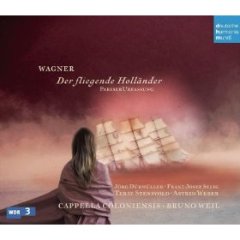Wagner – Der Fliegende Hollander (Bruno Weil) [2005]
Wagner – Der Fliegende Hollander (Bruno Weil) [2005]

CD1 1. Der fliegende Holländer/Overture 9:45 2. Der fliegende Holländer/Act I/Johohe! Hallojo! Hojohe! Hallojo!... Mit Gewitter und Sturm aus fernem Meer 9:14 3. Der fliegende Holländer/Act I/Die Frist ist um (Aria) 10:00 4. Der fliegende Holländer/Act I/Durch Sturm und bösen Wind verschlagen (Duet)... Mit Gewitter und Sturm aus fernem Meer 10:19 5. Der fliegende Holländer/Act I/Wohl, Fremdling, hab' ich eine schöne Tochter (Animato Duet) 4:50 6. Der fliegende Holländer/Act I/Vivace ma non troppo presto... Südwind! Südwind! Halloho! Hohoho! 4:14 7. Der fliegende Holländer/Act II/Summ und brumm, du gutes Rädchen 8:10 8. Der fliegende Holländer/Act II/Allegro ma non troppo. Johohoe! Traft ihr das Schiff im Meere an 6:34 9. Der fliegende Holländer/Act II/Allegro con fuoco. Ich sei's, die dich durch ihre Treu' erlöset! 2:34 10. Der fliegende Holländer/Act II/Bleib, Senta! Bleib nur einen Augenblick! (Duet pt. 1) 7:43 CD2 1. Der fliegende Holländer/Act II/Auf hohem Felsen lag ich träumend, sah unter mir des Meeres Flut (Duet, pt. 2) 4:11 2. Der fliegende Holländer/Act II/Mein Kind, du siehst mich auf der Schwelle (Aria)... Mögst du, mein Kind, den fremden Mann willkommen heißen (Aria) 7:22 3. Der fliegende Holländer/Act II/Wie aus der Ferne längst vergangner Zeiten (Duet) 13:12 4. Der fliegende Holländer/Act II/Verzeiht! Mein Volk hält draußen sich nicht mehr 2:36 5. Der fliegende Holländer/Act III/Steuermann! Lass die Wacht! 12:33 6. Der fliegende Holländer/Act III/Was musst ich hören? (Duet) 2:12 7. Der fliegende Holländer/Act III/Willst jenes Tags du nicht dich mehr entsinnen?... Verloren! Ach! Verloren!... Erfahre das Geschick 10:12 Terje Stensvold (Der Holländer), Franz-Josef Selig (Donald [Daland]), Astrid Weber (Senta), Jörg Dürmüller (Georg [Erik]), Simone Schröder (Mary), Kobie van Rensburg (Steuermann) WDR Rundfunkchor Köln Chorus Cappella Coloniensis Bruno Weil - conductor
This 1841 version of Richard Wagner's 'The Flying Dutchman' may not be a recording of merit as far as the performance is concerned and for Wagnerites who lust after the larger than life stories and music of Wagner this is definitely not a recording that will be durable in a collection. But taken for the important place it holds in Wagner's development as the penultimate romantic music opera composer it is a worthy entry.
The original orchestration is here played on original instruments of the time (1841) and adds a rather dry but eerie sound to this powerful ghost story of love and redemption. Bruno Weil conducts the orchestra and chorus of the Capella Coloniensis and the soloists are relative unknowns and include Jorg Durmuller, Fran-Josef Selig, Terje Stenwold, and Astrid Weber. Though there are interesting moments (and for those who know the ultimately revised version performed today those moments will be many), the entire performance feels tentative and the recorded sound is distant and not well mixed. But given those reservations, this is a recording of importance in that it allows us to hear Wagner at the beginning of his incredible learning curve - and for that it is worth hearing. --- Grady Harp (Los Angeles, CA United States), July 05
With this Dutchman on DHM, Bruno Weil attempts to refresh Wagner's classic by returning it to its original form. He deploys a scaled-down orchestra of period instruments (including both natural and valved brass, and an ophicleide in place of the modern tuba) and uses the original Paris version of the score, which predates even Wagner's own revisions made before the 1843 premiere in Dresden. Among other things, the Paris score eliminates Wagner's stylistically ill-fitting reworking of the overture from the 1860s, and transposes Senta's Act II ballad to the key of A minor. Far from an academic exercise in authenticity, Weil's effort is a compelling argument for rethinking the modern conception of Wagner's works, in which bigger is almost always better, and in which his early works are prized as much for their foreshadowing of his mature masterpieces as for their own qualities. Though smaller, Weil's orchestra is still majestic in sound while posing less of a balance problem for the singers; the subtle variety of wind colors shades the drama in unexpected ways. And the musical changes, though subtle to all but the most familiar listeners, leave the opera feeling more coherent, and less overgrown -- it was conceived as a one-act, after all. The performance is also musically compelling. Weil keeps the pot stirring at all times, and the Cappella Coloniensis sounds fantastic, especially in the restored overture. The singers are a capable and obviously experienced group of Wagnerians, led by Terje Stensvold as the Dutchman and Astrid Weber as Senta. But vocophiles are unlikely to prefer this journeyman group to the more marquees casts already available. Weber handles her transposed ballad capably, but her vocal timbre is anything but youthful. And Stensvold, though commanding, is uneven from moment to moment. Franz-Josef Selig is an unusually charming Donald (usually "Daland" -- this original version makes him a Scottsman), brimming with pride and warm generosity. In all, this is a performance of great value to those with a strong interest in Wagner, and of less to those who just want to hear great singing. ---Allen Schrott, All Music Guide
download: yandex 4shared mediafire solidfiles mega zalivalka filecloudio anonfiles oboom
Zmieniony (Niedziela, 29 Czerwiec 2014 22:06)








